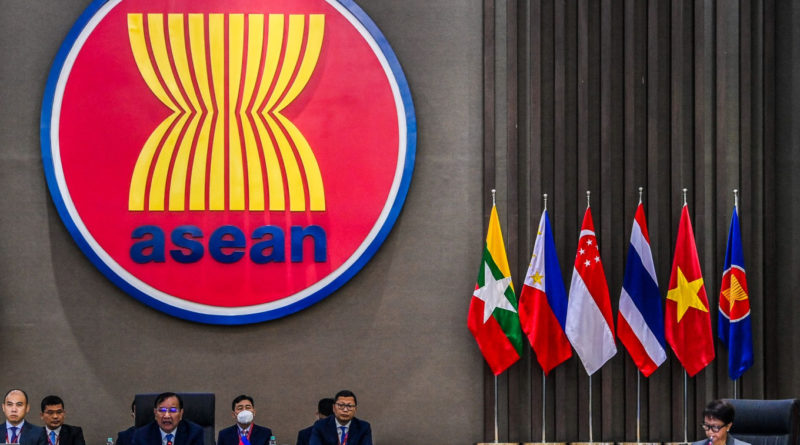Opinion-Column | Embarrassing, un-Asean way to prop up food supplies
.
EVEN before the Christmas lights are switched off for good for the current Yuletide season and tucked away in cabinets for reuse next year, an executive order (EO) of real urgency had been cleared through the bureaucracy and sent to President Ferdinand Marcos Jr. for signing — which Executive Secretary Lucas Bersamin signed on his behalf on December 22 and released to the public on the 26th — with January 2024 the most likely effectivity date.
The order, EO 50, extended the Duterte-era tariff cuts on rice, corn, pork and other meat items to Dec. 31 2024. No public consultation required, even with the local producers of the commodities covered. The move has been touted by sycophant in chief Arsenio “Rice can be P20 per kilo later” Balisacan as an inflation tamer, so ordinary Joes can buy food at cheaper prices, never mind that farmers and food producers — already buried six feet underground because of government neglect and clueless agricultural policies — will be dealt a thousand more cruel cuts by the tariff-cutting EO. Have I failed to mention that agriculture — which also includes lifting up the lives of farmers and food producers — is supposed to be the centerpiece agenda of Bagong Pilipinas? And the core strategy should be food production, not import dependency.
The tragedy, within an irony, enveloped in a farce.
Bagong Pilipinas, despite its incessant bombast about it, is morning in the Philippines and wondrous new things are happening in place of the decadent old ways, is still stuck with the same-old old, including ways to prop up national food security. Cutting tariffs, then hoping against hope that it would provide the solution to faltering and critical food supplies, has been the default policy position of the Duterte administration, then giddily adopted as a gospel of attaining food adequacy by Mr. Marcos’ Bagong Pilipinas.
Many depressing policy positions have not changed despite the promise of a new morning. Policy-wise, it is still UniTeam in the food and agriculture policy sector, with the government of Mr. Marcos adopting the worst of Mr. Duterte’s food policies wholesale, despite the reported cracks in the Duterte-Marcos/Romualdez relationship.
Question: Do you know of a more embarrassing and un-Asean way to prop up food supplies of the critical, staple kind? Nothing you can think of because the more you look around the region, the more depressed you will become on how far our regional peers have left us behind.
In the reckless, greed-driven, sky-is-the-limit rice importation after the passage of Republic Act 11203, or the “Rice Tariffication Law,” in February 2019, the Philippines imported 3.1 million metric tons (MT) and 2.7 million MT of the staple from Vietnam. This is a country that just became whole only after the fall of Saigon in 1975, after the Viet Cong humiliated the world’s greatest military power. And Vietnam is not just a country that exports 7 million MT tons a year to various foreign ports. It is an emerging industrial and manufacturing power as well, being the top choice of global companies that are reconfiguring their supply-chain requirements and moving out their assembly and manufacturing sites out of China. (This is perhaps relevant: their learning poverty rate is 18 percent; ours is a globally embarrassing 91 percent.)
Thailand is our second biggest source of imported rice, but that is just a subsidiary story.
Over the past several decades, Thailand has been selling us every agri-related item imaginable: toyo and patis, lanzones and atis, their version of durian, and their version of bagoong. During gift-giving seasons, the well-off snub the local lanzones varieties for the Thai-sourced ones. The agricultural breakthroughs were developed in the upper half of the past century by Thai agri pioneers who trained at the University of the Philippines in Los Baños. Today, while UP Los Baños has been steadily losing its academic prestige, Chulalongkorn University is now regarded as one of the best universities in the region, and Filipino agriculturists and animal science professionals often go there for graduate degrees.
This is worth mentioning. Thailand, aside from its thriving agriculture sector, is also the “Detroit of Asia,” the assembly site for best-selling sports utility vehicles and pickup trucks in industrially backward Philippines.
Indonesia, Malaysia, Laos and Cambodia are no agricultural slackers, either. If we move a bit further, we will learn that Bangladesh, whose sad state used to be a staple of Joan Baez’s haunting soprano, is now a major rice supplier in the global market.
But will anyone in polity, or anyone in policymaking, take both issues — our un-Asean food policies and our perpetual state of food precarity — seriously? Or will the reaction be like the reaction to our globally embarrassing educational mediocrity? Which is to either tiptoe around the two issues or adopt the more cynical reaction of indifference?
Many in the agricultural sector have been dreaming of the emergence of another Rafael Salas, the management and organization genius, who was the architect of our brief period of agricultural renaissance. And who was later pirated by the United Nations to handle its population office. But this is the sad history of the nation. The emergence of wunderkinds, like Salas in management and Benigno Aquino Jr. in politics, is a very rare occurrence. Through generations, we have to make do with lesser mortals. And in the agriculture sector, ordinaries charged with the stewardship of the Department of Agriculture (DA) have to confront seemingly hard-to-surmount hurdles.
First, the agricultural institutions are broken. The DA has morphed into a literal Department of Importation. The DA is more focused on its press release factory than its productivity offices.
The brutal wages of this weak, broken DA with its clueless leaders are all too apparent. The default policy position to augment short food supplies is tariff-cutting, not propping up our food security programs and strategies.
Embarrassing. Un-Asean. Pathetic.
.

@[email protected]



 Memento Maxima Digital Marketing
Memento Maxima Digital Marketing






